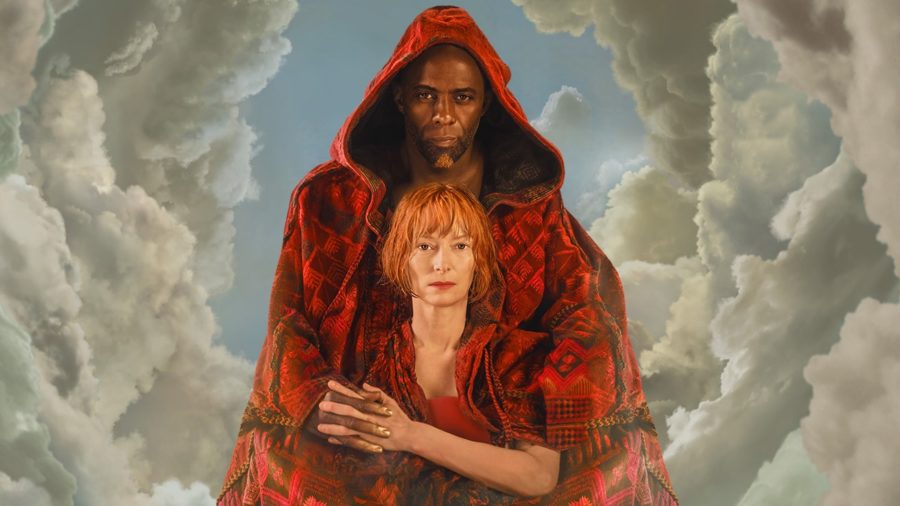“Three Thousand Years of Longing”: Is it worth the watch?
In “Three Thousand Years of Longing,” Tilda Swinton and Idris Elba capture their audience with stories of the love and loss of human existence.
September 2, 2022
Over the summer, movies—especially those viewed in a theater—became an ever-increasing pastime for my friends and I. Whether it was an early morning showing or an after-hours trip to the local mall, watching movies became a means to hang out with friends without the stress of planning. I won’t sit here and say that all of them were necessarily good simply because I enjoyed the experience and the company—I just like a good movie theater. So when the opportunity to continue this tradition at Case Western Reserve University arose, I jumped at the chance. Maybe it was the film choice or the change of venue from my usual AMC theaters, but my latest viewing of “Three Thousand Years of Longing” left me pondering many things.
The concept of the film is certainly interesting. It follows a scholar, Alithea Binney (Tilda Swinton), who studies narratives through a new perspective, as mythicism has been replaced by scientific explanations. Stories from the past were often explanations of things that we now know are scientific, like gods controlling the weather. But, in the film, she is left longing as her sense of wonder is missing. In her incessant need for science to explain everything, she is lonely in her scholarly exploration. This struggle between her rational self is manifested in demonic hallucinations that she simply dismisses. On a trip to Istanbul, she purchases a bottle, in which a Djinn (Idris Elba) is trapped and, upon his release, he begins to tell the story of how he became trapped in the first place. This retelling was the most captivating part of the film. I was immediately invested in the mechanisms that entrapped the Djinn. His constant suffering in his search for love and the historical elements—like his relationship with the Queen of Sheba or his involvement in the story of Suleiman the Magnificent—that were littered throughout them made it even more fascinating. Each of these stories are told with flashes of his present situation, where the Djinn is bound to Binney, as she is the one that released him. He cannot be free until he grants her three wishes. After being trapped in a bottle for thousands of years, constantly suffering as a result of his longing for a relationship, freedom is all he desires.
Following the final tale of his trapping, the film shifts back to the present, placing the audience in the hotel room with Binney. Throughout the film, she tries to rationalize not making wishes at all, first by suggesting that the Djinn is a trickster and then by stating she is content in her work. But it is obvious that she, like the Djinn, is longing for something more—it is here where she concocts her first wish. The scholar wishes that the Djinn would fall in love with her, and that their constant desire for companionship would end right then and there. It is this cinematic and plot decision that—in my opinion—marks the downfall of the film and the inspiration for this piece. I understand the message of the film, that love is not something that you can simply wish into being; it is something that develops over time. The Djinn’s health begins to struggle after returning to London with Binney and she must set him free, back to his world. But the sequence felt like pulling the emergency brake in your car; it jolted the film to a startling halt. It took the film from a fantastical historical fiction piece into an extremely slow romantic sequence. I was far more invested in the story of the Djinn traveling through three thousand years of human history than I was in their domestic life and the inevitable downfall of their relationship. And that is where the film lost me; a rapid change of pace that conveyed a story the audience wasn’t entirely invested in.
Despite the disappointing ending, I don’t want to entirely discount the film just because aspects of it were not entirely my cup of tea. It was certainly thought provoking, with many metaphors about the expectations of love and desire. The jump through human existence, from the perspective of an outsider, was definitely refreshing and shed new light on interpersonal relationships. However, the change in pacing of the film and the decision to have a character—who for the entirety of the film argued that she was content in her solitude—suddenly decide to wish for love took away from the film’s intrigue. It broke the veil on what the film was really about and shattered the juxtaposition of these two beings: one content in their loneliness and one eaten alive by it. The film certainly sparks conversations about the meaning of love and suffering, about human existence and about manifesting desires. But this was overshadowed by the ending of the film that, in my opinion, takes away from its metaphorical meaning. Though this film may not have been for me, if you want to watch something thought provoking and interesting, a film to have hours of conversation with your friends about, whether positive or negative, then I would surely recommend you give it a watch.




